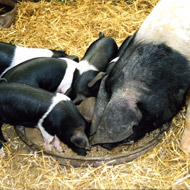Pig sector to explore zinc oxide options post-Brexit

Zinc-oxide is used to prevent, control and treat diarrhoea in young pigs.
The UK’s National Pig Association (NPA) has said that it will continue to explore options for using products containing zinc oxide when Britain leaves the European Union.
The NPA and other industry stakeholders met with the Veterinary Medicines Directorate (VMD) last week to discuss the EU zinc oxide ban. The meeting included the Pig Veterinary Society, the Agricultural Industries Confederation and the Agriculture and Horticulture Development Board.
NPA’s senior policy advisor Georgina Crayford said: “We had a useful meeting with the VMD to discuss implementation of the withdrawal of licenses for high-level zinc oxide in the UK.
“There was some discussion around the potential to obtain a local (UK) license for the products once we have fully left the EU, although the uncertainty around Brexit means VMD could not provide any clear answers at this stage. A lot depends, for example, on the transition period and whether 2019 or 2021 is considered the date we leave.”
“My understanding is that although the VMD wouldn’t automatically reverse the Commission's decision – it might be open to exploring options for authorising products in the UK. NPA will continue to explore this and support efforts to gather the necessary environmental data.”
Zinc-oxide is used to prevent, control and treat diarrhoea in young pigs. According to the NPA, an estimated 70 to 90 per cent of starter diets in the UK contain zinc oxide at therapeutic levels.
Reiterating the challenges facing the pig industry when it comes to removing medicinal zinc oxide, Georgina said:
“The issues that we raised when we originally opposed the ban have not changed – for example, the lack of viable alternatives, the disease challenges facing the UK pig herd and the age of our buildings due to a lack of industry investment. All of this will be compounded by the need the industry to reduce our antibiotic usage at the same time as phasing out zinc oxide.
“The Commission rarely gives any flexibility in these types of decision, so we are relieved that we managed to secure a five-year phase-out period, every minute of which will be needed to give the industry time to adapt.”



 The Animal and Plant Health Agency (APHA) has updated its online reporting service for dead wild birds.
The Animal and Plant Health Agency (APHA) has updated its online reporting service for dead wild birds.